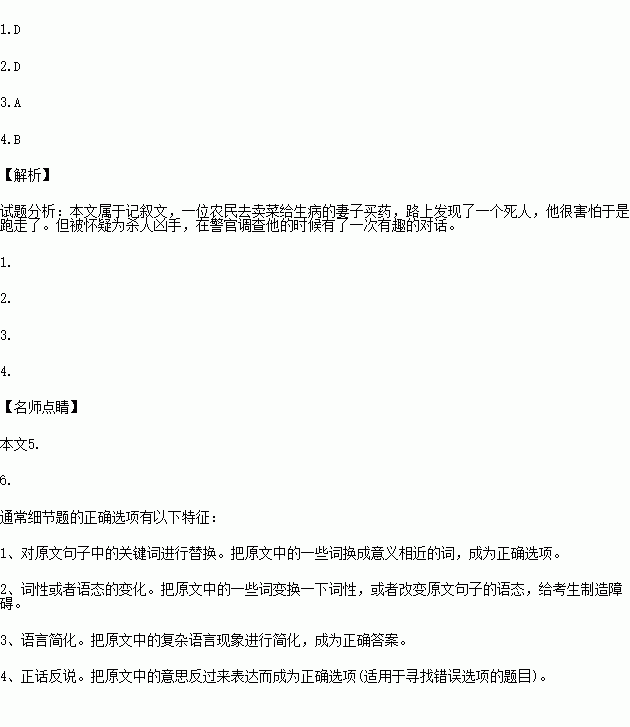题目内容
A farmer grew some vegetables in his garden. One day his wife was ill and he had no money. He had to sell some cabbages and carrots in the market. The next morning he took two baskets of vegetables to town, but it was raining hard that afternoon and there were few people in the street. When his vegetables were sold out, it was dark. He bought some medicine and hurried to his village.
On his way home he saw a person lying on the ground. He placed his baskets on the ground and was going to help the person to get up. At that time he found it was a dead man and there was much blood on his body. He was so afraid that he ran away quickly, without taking his baskets.
The next afternoon the farmer was sent to the police station. Having shown the baskets, an officer asked, “Are these yours? ” “Yes, sir. ” The farmer answered timidly(胆怯地). “Have you killed the man?” “No, no, sir.” The farmer said in a hurry. “When did you see the dead man?” “About seven last evening. ” “Did you see who killed the man?” “No, sir. ” The officer brought out a knife and asked, “Have you seen it yet?” “No, sir. ” The officer became angry and told the policemen to beat him up and sent him into prison.
That evening the officer went on trying. Pointing to the knife, he asked again, “Have you seen it yet?” “ yes, sir.” The officer was happy and asked, “When and where?” “I saw it here this afternoon, sir.”
1.Why did the farmer decide to sell the vegetables?
A. To go to the market.
B. To go to see the doctor.
C. To buy some food for his family.
D. To buy some medicine for his wife.
2.The farmer didn’t sell out his vegetables until the evening because ________.
A. they were too bad
B. they were very expensive
C. it rained hard that morning
D. people wouldn’t go out on such a bad day
3.Why did the farmer run quickly?
A. He was afraid to see a dead man.
B. His wife was waiting for him at home.
C. The policemen were coming towards him.
D. It was so late and he had to buy some medicine.
4.The officer tried(审讯)the farmer to _______.
A. ask if he had seen the knife
B. know who had killed the man
C. ask when he saw the dead man
D. know if he had seen the dead man
 阅读快车系列答案
阅读快车系列答案
